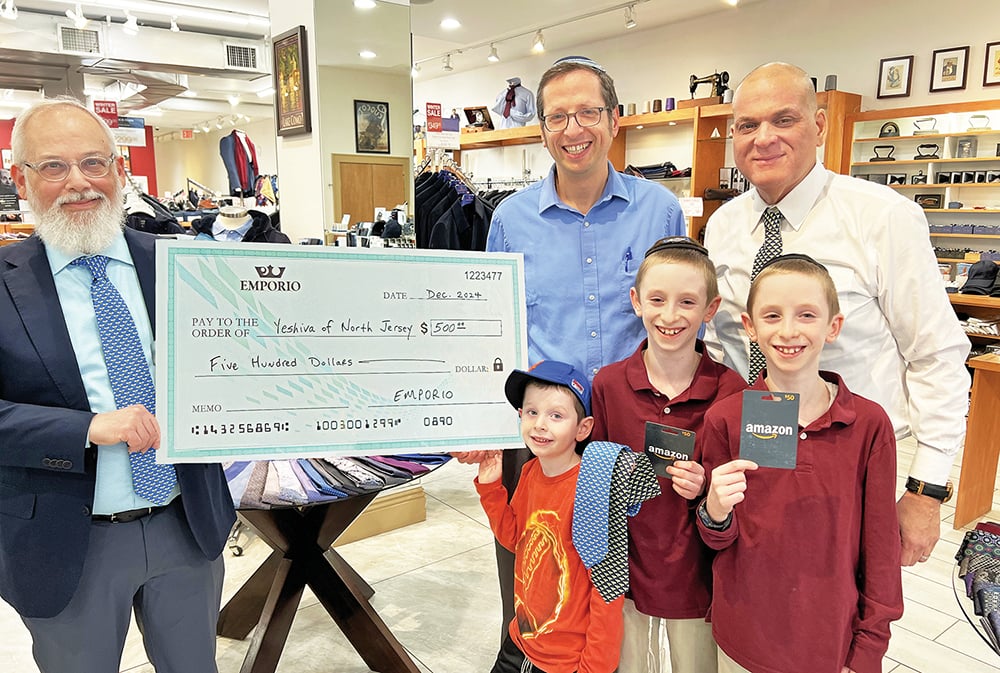The sisterhood of Congregation Beth Aaron, headed by Debbie Sheffey and Gabriellle Silverberg, invited Dr. Michelle Sarna, wife of the UAE Chief Rabbi Yehuda Sarna, to address the community on Zoom this past Sunday evening, January 16. A large group of participants took advantage of this opportunity to hear what is actually happening on the ground across the world with Jewish residents in a Muslim country.
The Jewish presence in the UAE began long before the Abraham Accords were signed. In the 1970s, after the fortuitous discovery of an oil resource yielding enormous revenue, the leaders of the UAE, encompassing seven Gulf States, decided to establish a university to serve as a global educational center on equal footing with Cambridge and Oxford. Ten years ago, Rabbi Yehuda Sarna, executive director of the Bronfman Center at NYU, chaplain and professor at the Wagner School of Public Policy, together with his colleague and friend the Imam at NYU, was summoned by then-president of NYU John Sexton, with a proposal. Sexton said that since NYU was granted the opportunity to establish a global university in Abu Dhabi, the capital of the UAE, he wanted the two religious leaders to fly out and meet with faculty, staff and students. Their mission was to establish a tone of openness and tolerance within the international population at the university. And so began the periodic trips of the Sarnas to the UAE, long before their borders were opened to Jewish travelers.
According to Dr. Sarna, before the Abraham Accords, approximately seven years ago, the Jewish community in the UAE was very discreet. Their shul in Dubai was initially housed in the home of a South African couple and their minyan was small. Gradually, the minyan grew and rented a villa on the beach to house their services. Upstairs apartments hosted Shabbat and Yom Tov guests from different parts of the country. This small community of Jews was greatly diverse and consisted of Austrians, English, French, Belgians, Canadians and a sprinkling of Americans. Their religious affiliations spanned chasidic to secular. Eventually, Jewish Council of the Emirates invited Rabbi Sarna to become the chief rabbi. As the Sarnas are proud parents of six children, currently ranging in age from 18 to 7, they decided to visit five or six times per year to start. In the shadow of COVID, this year they were able to visit only three times.
Dr. Sarna described that Dubai residents come from throughout the world to enjoy the exceptional quality of life offered. The native Emiratis are for the most part private and humble. Their attitude towards the Jews in their midst is mainly open-minded and curious. They feel a kinship with their Israeli neighbors. Local schools were using a textbook which totally obliterated any mention or picture of Israel. This was rectified recently. Emiratis are frequenting kosher restaurants in an attempt to familiarize themselves with the new culture and cuisine. Common interests and values include modest dress for the women.
With the influx of Israeli and American Jewish tourists this past Rosh Hashanah through Sukkot, the miyanim were moved to local hotels. On Simchat Torah, the Emirati owner of one of the hotels came by to warmly welcome the tourists and spoke about extending peace among the Emirates and surrounding states.
“Considering that the residents include Egyptians, Pakistanis and Syrians, the UAE’s warm welcome to Israel is no simple matter,” shared Sarna.
On a personal note, Dr. Sarna shared that when she and her children, sporting kippot and tzitzit, enter an Uber, they feel genuinely welcome. When they carried their lulavim and etrogim through the airport, they were greeted with smiles. For the first time this Rosh Hashanah, the Jewish community came out for tashlich in significant numbers.
Dr. Sarna feels that the UAE is “moving bravely and boldly in the right direction.The hope is that we and our children will also extend ourselves beyond the divide, expand our perspectives and be aware of our biases.” Rabbi Yehuda Sarna and the current Imam of NYU are still very much involved in vetting the international students accepted into the prestigious satellite of NYU in Abu Dhabi. Rabbi Sarna was instrumental in bringing Rabbi Dr. Elie Abadi from New York City, a noted rabbinical figure and physician, to serve as the senior rabbi in residence in Dubai. There is also a local Chabad Rabbi working in tandem with the others. Kosher restaurants are sprouting up daily and a complete Jewish infrastructure is being planned for the near future. One of the Jewish leaders of the community, Eli Epstein, a businessman from New Rochelle, continues to be a friend and strong supporter of the community.
Citing a beautiful idea in the name of Rabbi Lord Jonathan Sacks, zt”l, Sarna described a dialogue between Hashem and Batya, daughter of Pharaoh. “Hashem says to Batya, ‘Moses was not your actual son and yet you referred to him as such. In this merit, even though you are not a daughter of my people, I will refer to you as my daughter, Batya.’ Batya was rewarded for her ability to ‘see across the divide,’ to bring a son of her enemies into her palace as a son. May we merit to live peacefully with our new partners in peace.”
Dr. Michelle Sarna has worked alongside her husband at NYU for the past 18 years. She has served as the associate director for training and professional development of the OU’s Jewish Learning Initiative on College Campuses (JLIC) and the JLIC educator at NYU. She holds a Ph.D. in school psychology from Fordham University and serves as a psychologist at SAR Academy and Camp Stone. She has a private practice and lectures widely in matters of family life, spirituality and development. She can be reached at [email protected]
By Pearl Markovitz













